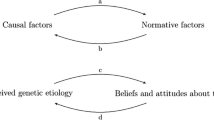Abstract
Over the past two decades the pace andspecificity of discoveries associating geneticswith mental illness has accelerated, which isreflected in an increase in news coverage aboutthe genetics of mental disorder. The newsmedia is a major source of public understandingof genetics and a strong influence on publicdiscourse. This paper examines the newscoverage of genetics and mental illness (i.e.,bipolar illness and schizophrenia) over a 25year period, emphasizing the peak period of1987–1994. Using a sample of 110 news storiesfrom 5 major American newspapers and 3 newsmagazines, we identify the frame of ``geneticoptimism'' which dominated the reporting ofgenetics and mental illness beginning in themid-1980s. The structure of the frame iscomprised of 3 elements: a gene for thedisorder exists; it will be found; and it willbe good. New discoveries of genes wereannounced with great fanfare, but the mostpromising claims could not be replicated orwere retracted in short order. Despite thesedisconfirmations, genetic optimism persisted insubsequent news stories. While the scientificaccuracy of the gene stories is high, thegenetic optimism frame distorts some of thefindings, misrepresents and reifies the impactof genes on mental disorder, and leaves nospace for critics or an examination ofpotential negative impacts. The stances ofreporters, scientists and editors may all indifferent ways contribute to the perpetuationof genetic optimism. Genetic optimism presentsan overly sanguine picture of the state ofgenetics; as we enter the genetic age it isimportant to balance the extraneous ``hype andhope'' contained in news stories of genetics andmental illness.
Similar content being viewed by others
REFERENCES
Alper, J. 1999 Genetic Complexity in Human Disease and Behavior. Unpublished manuscript.
Binder, A. 1993 Constructing Racial Rhetoric: Media Depictions of Harm in Heavy Metal and Rap Music. American Sociological Review 58: 753-767.
Condit, C. 1999 The Meanings of the Gene: Determination, Discrimination, and Perfectionism in U.S. Public Discourse. Madison: University of Wisconsin Press.
Conrad, P. 1997 Public Eyes and Private Genes: Historical Frames, News Constructions, and Social Problems. Social Problems 44: 139-154.
1999a A Mirage of Genes. Sociology of Health and Illness 21: 228-239.
1999b The Uses of Expertise: Sources, Quotes and Voice in the Reporting of Genetics in the News. Public Understanding of Science 8: 285-302.
Conrad, P. and S. Markens 2001 Constructing the “Gay Gene”: Optimism and Skepticism in the News. Health: forthcoming.
Conrad, P. and D. Weinberg 1996 Has the Gene for Alcoholism been Discovered Three Times since 1980? A News Media Analysis. Perspectives on Social Problems 8: 3-24.
Corbin, J. and A. Strauss 1990 Basics of Qualitative Research. Newbury Park, CA: Sage Publications.
Durant, J. and A. Hansen 1995 The Role of the Media. In Parliaments and Screening: Ethical Issues Arising from Testing for HIV and Genetic Disease. W.K. Kennet, ed., pp. 89-121. Paris: John Libby Eurotext.
Egeland, J.A., D.S. Gerhard, D.L. Pauls, J.N. Sussex, K.K. Kidd, C.R. Allen, A.M. Hostetter and D.E. Housman 1987 Bipolar Affective Disorders Linked to DNA Markers on Chromosome 11. Nature 325: 783-787.
Floersch, H., J. Longhofer and K. Latta 1997 Writing Amish Culture into Genes: Biological Reductionism in a Study of Manic Depression. Culture, Medicine and Psychiatry 21: 137-159.
Gamson, W. 1992 Talking Politics. New York: Cambridge University Press.
Gamson, W. and A. Modigliani 1989 Media Discourse and Public Opinion on Nuclear Power. American Journal of Sociology 95: 1-37.
Gans, H.J. 1979 Deciding What's News. New York: Pantheon.
Gershon, E., J.A. Badner, L.R. Goldin et al. 1998 Closing in on Genes for Manic Depressive Illness and Schizophrenia. Neuropsychopharmacology 18: 233-241.
Gitlin, T. 1980 The Whole World is Watching. Berkeley: University of California Press.
Glaser, B. and A. Strauss 1967 The Discovery of Grounded Theory. Chicago: Aldine.
Hall, L.L. (ed.) 1996 Genetics and Mental Illness: Evolving Issues for Research and Society. New York: Plenum.
Hilgartner, S. and C. Bosk 1988 The Rise and Fall of Social Problems: A Public Arenas Model. Ameican Journal of Sociology 94: 53-78.
Hubbard, R. and E. Wald 1993 Exploding the Gene Myth. Boston: Beacon Press.
Klaidman, S. 1993 Health in the Headlines. New York: Oxford.
Kelsoe, J.R., E.I. Ginns, J.A. Egeland et al. 1989 Re-Evaluation of the Relationship between Chromosome 11p and the Gene for Bipolar Affective Disorder in the Old Order Amish. Nature 342: 238-243.
Koren, G. and N. Klein 1991 Bias Against Negative Studies in Newspaper Reports of Medical Research. JAMA 266: 1824-1826.
Molotch, H. and M. Lester 1974 News a Purposive Behavior: On the Strategic Use of Routine Events, Accidents and Scandals. American Journal of Sociology 39: 101-112.
Nelkin, D. 1995 [1987] Selling Science: How the Press Covers Science and Technology. New York: W.H. Freeman.
Nelkin, D. and M.S. Lindee 1995 The DNA Mystique: The Gene as a Cultural Icon. New York: W.H. Freeman.
Office of Technology Assessment 1994 Mental Disorders and Genetics: Bridging the Gap between Research and Society. Washington, DC: U.S. Government Printing Office (OTA-BP-H-133).
Philo, G. (ed.) 1996 Media and Mental Distress. London: Longman.
Rothman, B.K. 1998 Genetic Maps and Human Imaginations: The Limits in Understanding Who We Are. New York: W.W. Norton.
Schudson, M. 1989 The Sociology of News Production. Media, Culture and Society 11: 263-282.
1995 The Power of News. Cambridge: Harvard University Press.
Sherrington, R., J. Brynjolfsson, H. Petursson et al. 1988 Localization of a Susceptibility Locus for Schizophrenia on Chromosome 5. Nature 336: 164-167.
Spector, M. and J. Kitsuse 1977 Constructing Social Problems. Menlo Park, CA: Cummings.
Tuchman, G. 1978 Making News: A Study in the Construction of Reality. New York: Free Press.
Van Dijck, J. 1998 Imagenation: Population Images of Genetics. New York: New York University Press.
Author information
Authors and Affiliations
Rights and permissions
About this article
Cite this article
Conrad, P. Genetic Optimism: Framing Genes and MentalIllness in the News. Cult Med Psychiatry 25, 225–247 (2001). https://doi.org/10.1023/A:1010690427114
Issue Date:
DOI: https://doi.org/10.1023/A:1010690427114




